Dear Friends,
I’m sharing the ‘manifesto’ of the week—a discussion of national myth-making. At the partner site
, tackles eureka moments in science and literature.Best,
Sam
NATIONAL MYTHS OLD AND NEW
“We need a new national myth,” says a friend.
It’s the kind of thing that sounds good in conversation, that I find myself agreeing with, that seems to hit on some deep truth—although I don’t necessarily know what it means.
The sense is that there are two dueling national myths—one the inverse of the other. The first myth is 1776; the Mayflower; Washington and the cherry tree; Lincoln and the more perfect union; the GIs with the ‘ok’ sign; the rebuilding of Germany and Japan.
The inverse myth is 1619; America founded in the original sin of slavery and genocide; the craven compromises of the antebellum period; Jim Crow; KKK; the atom bomb; Vietnam.
What’s so peculiar is that, in my lifetime, I can feel the center of gravity shift from one myth to the other. Of course America is fundamentally benevolent was the reigning belief system when I was growing up—confirmed, if there was any real doubt, by the bankruptcy of Communism and the outrage of 9/11. Now—without anything all that dramatic really happening, no invasion, civil war, economic collapse, etc—it’s almost taken for granted across the political spectrum that the American project has failed. And it’s characteristic of the current political climate that the myth-making splits into two camps: ‘the 1776 project,’ which holds that America was on the right track initially, before liberals got ahold of the national narrative, and needs to be restored to its roots; and ‘the 1619 project,’ which holds that America is irredeemable from its original sins.
Balanced, historically-minded people would tend to argue that neither myth has much to do with the knotty realities of history. On the one hand, America was never innocent or wholly virtuous. On the other, that’s an impossible bar to set—and it’s to be expected of any nation that it will fall short of its ideals in so many ways without that critique somehow delegitimizing a national project.
But we’re dealing here with myths, not history, and that kind of nuance goes to waste. Gen Z—en masse, it seems—has hit on a new national myth. That one holds that America was steeped in original sin but that sin is redeemable through a process of atonement—through taking on the trauma of the persecuted, through privileging the experience of anyone subjugated by the cis heteronormative white patriarchy.
It’s excruciatingly easy to take aim at all of the premises of that structure—above all, its facile demarcations of society into oppressors and victims—but, to give it credit, it is a concerted attempt to construct a new national myth. In that view, we are in an age of atonement—the parallels to South Africa’s truth and reconciliation are prominent and under-appreciated—and that will last for some unspecified period of time until the founding sins are fully grappled with, the power structure sufficiently altered, maybe even the Constitution revamped, and the country aligned with a vision of diversity that may only have been dimly glimpsed in the actual historical founding.
It’s a wild and deeply impractical vision that nonetheless has a startlingly tenacious hold on the American psyche at the moment—which, more than anything, is a testament to the power of myth-making. It doesn’t work to try to suggest some alternative myth—that’s not how myths work. Personally, I’m fond of the myth that seemed to be encoded in Obama—‘the bridge,’ ‘the ever more perfect union,’ the idea that America was constantly reforming, constantly becoming more pluralistic and diverse while retaining a certain fundamental meritocratic structure—but that myth (again, for no very concrete reason) has sailed straight out of the zeitgeist.
I guess all I’ll say is that it seems both bizarre and unrealistic that all the versions of the American myth on offer are so thoroughly domestic—either republican virtue or founding sin. What’s missing in all the myths on the table is that at some point during the 20th century America’s real meaning became international—as a new type of capitalist neoliberal empire; as a hegemon protecting a sprawling network of allies through the threat of overpowering force. It’s a complicated, confusing legacy—but I have the sense that all of the attempts at myth-making, positive or critical, are somehow dancing around the reality of empire and are all the poorer for failing to engage with it. It was the black-and-white images of smiling GIs in Europe—a very different kind of liberator from the Red Army—that first generated a compelling American myth for me; and that was nearly undone by my comprehension of the civilian bombing campaigns, Vietnam, the CIA’s operations across the developing world.
The Ukraine war strikes me as an excellent opportunity—and I mean this in a good way—for myth-making. The war is a salutary reminder that, bad as we might be, there are actors in the world that are far worse; and there are nations—Ukraine, Taiwan, Eastern Europe virtually as a whole—that have chosen, very freely, to be part of the American sphere of influence as opposed to that of a regional potentate. That’s a reminder that, in a tough world, in the eternally ambiguous zone of international politics, America can be a force for good. As we start to really tear ourselves apart—the talk of a ‘national divorce’: the dueling myths of 1619 and 1776—it’s useful to have a somewhat more jaundiced, more practical national myth. To remind ourselves that the world is full of genuinely dangerous autocrats; that America, through luck of the draw really, has a surprisingly robust civil society and that there is something in that structure, at once loose and resilient, that is worth preserving and worth fighting for. It’s still perfectly possible to be patriotic—it’s just worth acknowledging that that patriotism isn’t directed towards some intrinsic national virtue but to a system of organizing civil society that maximizes individual freedom.






A provocative premise. George Packer has a less binary formulation in LAST BEST HOPE, where he identifies four Americas. Free America is the Reagan-esque version, generally socially permissive with a focus on the international and domestic marketplace (your 1776 myth figures prominently here). Real America is the Palin-esque version -- now the MAGA view, leaning heavily toward the theocratic myth. Smart America is the Clinton/Obama model, the moderate elites. And Just America is everything you've said about the age of atonement.
Sometimes student writing is an interesting mirror for your own pedagogy. Back in 2016, while I was still teaching full-time, I added an essay question to my American Literature exam: What makes America great? The most memorable response was a two-part essay. The first half began, "America is not great. America has never been great." And then it went from the atrocities committed by Columbus and other conquistadores through the Native American Holocaust and slavery -- very much the 1619 version. The second half began, "America is great. America has always been great." And that version ran through the legacy of dissenters, beginning with Anne Hutchinson and Roger Williams, and then featuring voices of resistance (Douglass, Jacobs) and white abolitionists (John Woolman, Thoreau).
The roots of Just America run deep -- all the way back to the beginning. I'm not sure I have the space here to do it justice, but there is a kind of irreconcilable contradiction in the oppression/opportunity dialectic when one thinks about immigration. Nearly everyone who emigrated to America was oppressed (some wealthy exceptions originally, I guess) before they found opportunity. The American Dream really took hold in the nineteenth-century, the first Age of Migration, and it seemed to hold reasonably steady through the mid-twentieth century. Vietnam, it seems, marked the end of that illusion. I suppose the Obama/MLK line on this is the long arc of history bending toward justice -- for women and people of color. But it's kind of unbelievable to think that women's suffrage did not succeed until 1920. And the histories of redlining are also impossible to ignore.
What you're talking about are myths of identity. But the myth of opportunity is a competing narrative -- and the core of it is that anyone, regardless of how oppressed they once were, can find a way to make it in America. I think the death of that myth is perhaps the most crushing of all. In fact, Substack is kind of a microcosm of it: the illusion that anyone can turn a side hustle into a full-time job, when the deck is clearly stacked, and anyone who beats those odds is the outlier, not the rule.